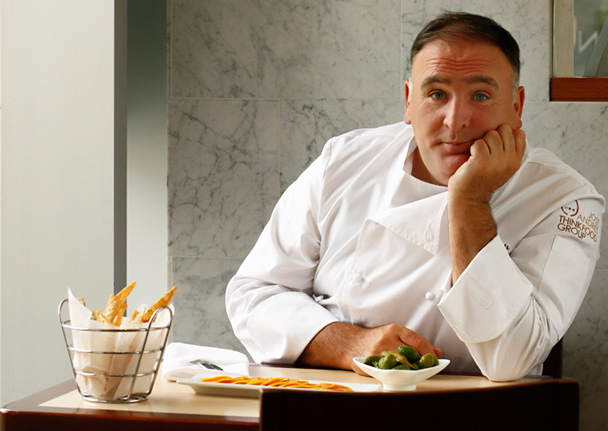José Andrés is one of America's most successful chef/restaurateurs, with 13 restaurants, one food truck, two television shows, two books, a catering company, and a charitable organization to his credit. Read on for a preview of Andrés' upcoming Harvard lectures, why failure is integral to success, and how rice, tomato sauce, and fried eggs sparked a remarkable career.
Gourmet Live: You grew up just outside Barcelona and at 15 decided you wanted to be a chef. Why?
José Andrés: I remember being a young boy in Spain and watching my parents cook. We didn't go to a lot of restaurants because we didn't always have the money, so cooking at home was just what we did. At the beginning of the month, when we had more money, we would cook more meat. But at the end of the month, we would make more humble dishes made from the vegetables, beans, cheeses, and eggs we found at the markets. It's funny—I would always look forward to the end of the month. These were the dishes that were comforting to me. I remember making huevos a la cubana, a humble dish of rice, tomato sauce, and fried eggs. It was these dishes that made me appreciate every ingredient, made me realize what the goodness of the earth had to offer and how we can use these ingredients to come up with the most amazing dish just by allowing those ingredients to interact.
GL: You attended culinary school in Spain in the 1980s. What type of philosophy was instilled in you? Was it the importance of high-quality ingredients? Spain's iconic dishes? Technique, technique, technique?
JA: I started culinary school at a very young age, and really I wanted to be out working, cooking, more than I wanted to be in a classroom. You could say I wasn't a very good student—I wanted to be a student of life and experience. I studied at the Escola de Restauració i Hostalatge de Barcelona [the School of Restaurants and Hotels in Barcelona], and at that time Spanish gastronomy was undergoing an evolution, so it was really an amazing time. I began to understand that to be a good cook you have to have a relationship with every ingredient to really understand how they come together, because sometimes the best dishes are made of the most simple ingredients.
GL: Starting out, was there a chef whose career you admired and wanted to imitate?
JA: Anyone who knows me knows that I have never been shy about how important Ferran Adrià has been in my life; he is a friend, a mentor, an inspiration. But when I first began, and this was also during my time with the Spanish navy on a tall ship, I wanted to learn and see what was happening out there. Those experiences, the foods I was able to taste and see during my time on board, they only fed my passion. But don't forget, where we were in Catalonia, there had already been great men like Josep Mercader who had begun to transform Spanish cuisine, then the great chefs in the Basque region, like Juan Mari Arzak. Where I was, I could easily look over to France at what had been happening there in the '80s. After school, I traveled to see Michel Guérard, Michel Bras, Frédy Girardet. I wanted to see it all. I was hungry to learn, to see, to understand.
GL: What was your time like training at El Bulli? What did you learn from your now-good friend, Ferran Adrià?
JA: When I came to El Bulli, right away I knew I was becoming part of something incredible. It was like watching the big bang happening right in front of me. We learned how to think beyond the ingredients in front of you. But what we were experimenting with, what we were questioning was, why do we only have to be feeding our stomach, and our brain, within the parameters we know? Why can't eating also be feeding our brain, our senses, beyond what we feel comfortable with?
But maybe the most important lesson I learned from El Bulli was to not be afraid of failure because success could be just around the corner. We experimented with techniques that nobody has ever tried before and sometimes we would discover something so amazing. But there were also times that we failed. I think it was Winston Churchill who said, "success is going from failure to failure without losing enthusiasm." Those are words that I live by.



 Pinterest
Pinterest


